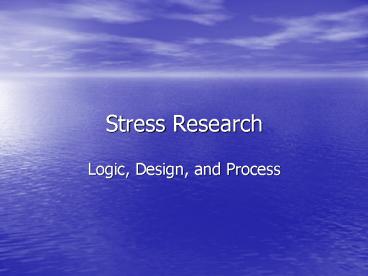Stress Research - PowerPoint PPT Presentation
1 / 12
Title: Stress Research
1
Stress Research
- Logic, Design, and Process
2
4 Ways of Thinking
- Formalistic A or B
- Mechanistic A causes only B
- Contextual Perception looms relational,
multi-causal - Organistic systems, interrelated causalities and
reactions.
3
Research Vocabulary
- Proximal causes acute episodes.
- Distal causes remote disturbances appearing
again. - Precipitating factors immediate response
provoking events. - Predisposing factors biological-genetic factors.
4
Research Variables
- Independent treatment condition, cause,
environmental stimulus. - Dependent behavior, effect.
- Goal is to try to establish a link between IV
and DV to generalize to a larger population.
5
Assessment Issues
- 1 Use a standardized test.
- Problems?
- Advantages?
- 2 Create your own test.
- Problems?
- Advantages?
6
Accuracy
- Validity measures what was set out to be
measured. - Reliability consistently measures the same
aspect with the same results. - Test-retest same test two different times.
- Alternate-forms two different tests.
- Split-half two scores from same test.
7
Credibility ? Validity
- Content Validity test content is correct for
behavior to be measured. Not a statistical test,
rather an expertise based decision. (Experts
determine). - Face Validity basic, laymens logic to determine
if test seems right for behavior. - Criterion-related Validity comparing test
outcome to alternate source of data. - Construct Validity we are measuring exactly what
we say we are measuring.
8
Types of Studies
- Case Studies
- Great depth, low number, generally used for very
small, specific, unique populations. - Field Studies
- Survey good vs. bad?
- Ex-Post-Facto used for events that are either
unethical to produce or unpredictable. - Ecological Momentary Assessment idea is to
monitor events in their own environment.
9
Types of Studies
- Correlational Designs
- Looking for patterns to research further.
- Correlation doesnt imply causation.
- Cant be causation with correlation.
- Single-Subject, Baseline Reversal
- Baseline phase and then treatment phase.
10
Types of Studies
- Pre-Post Designs
- Control groups?
- Placebo effect?
- Attention-Placebo control do something but not
the same treatment as is given to the treatment
group. - Factorial Designs utilizing more than 1 IV.
11
Types of Studies
- Groups of groups.
- Within-subjects observations made on same group
but at different times. - Between groups two distinct groups with two
distinct treatments. - Mixed Design is the combination of both.
12
Types of Studies
- Meta-analysis
- Examines previous research on a given topic.
- A compilation or greatest hits of sorts.
- Greatest limitation is the studies being
reviewed. - Be mindful of how the author portrays qualitative
and quantitative research.































